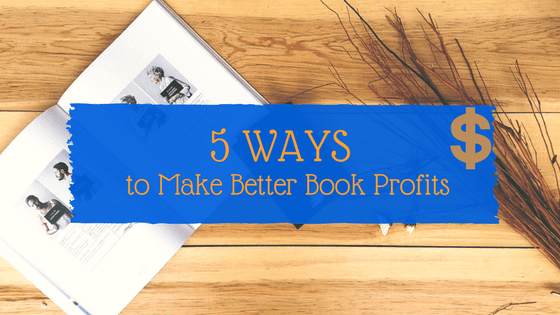Here we are all for better book profits for non-fiction authors, with fewer costs; that’s what it’s all about, really. So first we’ll knock off some easy wins and then move onto advanced methods.
1. Keep your Book Production Costs Low
My first tip for better book profits is keeping production costs low in the first place. This may mean using a Book Design template and learning styles in Adobe InDesign*, or simply keeping production costs to a minimum by getting three editing quotes from editors with testimonials.
The other way to save costs is to use Print on Demand, ordering a small number of personal author copies, like ten, rather than ordering in bulk from a printer (conceivably less per copy, but with a much higher risk).
Making better royalties also depends on the LENGTH of your book and black-and-white versus full colour. If you go full colour for indie publishing, don’t expect very much royalty. Perhaps you can charge $60 for a hardback, fully designed photo book, and make a profit of around $25 per book; good on you if you can get that happening. But generally, it’s not so easy. You can judge different print costs of books if you get the IngramSpark print fees guide, as they lay out how many cents it will be per page. (You’ll have to request this).
2. Make Your eBook Pay for your Print Version
I plan on doing my next how-to book as an eBook first, and if mildly successful with online marketing and JVs, then I will produce it as a beautifully designed book. There’s no point learning all this amazing design stuff if you don’t apply it, is there! Once designed, I can launch a revised edition with full colour imagery and easy-to-read layout. I might also find a partner, but it must be an independent voice.
I like to create some income along the way of creating books. What about you?
______
* Note: If you are trying to use Word for print book layout and DIY, then it may cause difficulties when opting for IngramSpark. There is a workaround by using full Adobe Acrobat PRO (and its Distiller) to get the required PDFx1-2001 file. If you are using Apple Pages, there also doesn’t seem to be a PDF-X output setting. So if you don’t outsource design, you may have to go with Lulu (high print charge), Blurb, or Amazon Print. I recommend using an experienced book designer or learning InDesign and book design yourself.
3. More Ways to Make Better Book Profits
If you want to get the most profits from your book, you might need higher-level publishing advice. Some examples include:
a) Selling through your website with a pre-order (once it’s nearly complete), or
b) Going out and selling the books at speaking gigs (a benefit is you don’t pay extra to put the books there), or
c) Joint venturing with corporate partners. I believe the most upside for those who aren’t yet influencers is with c) joint ventures.
Choices, choices. So many novice authors go the way of paying for book promotions, because they don’t know how else to sell their book, their baby. Expert authors could better use advertising options, like Amazon ads, but for novices on a budget, no way. There are just too many sharks and those waters are really deep!
4. Cheap Ways to Promote your Book
If you want a cheap way to promote your book, just write and connect. Write 50% of the time! Write on relevant zines and popular blogs, write a column in a huge online zine, or even your local business magazine. That’s what I did. Before any launch, write a press release and send it in to relevant mass media on NewsMaker (Australia) or PRWeb (the world). Or find your own sources — that’s even better.
Connect. Don’t waste too much time connecting to others in the same boat (like on Goodreads author-bloggers forums). You need a leg up, so look for some people on Facebook who are influential and prolific in your space. Then give them something they want. I wasted so much time NOT doing this, I could kick myself up and down the country. It only takes your offer of a book review for them, a pleasant review, and you’re on your way.
5. Tips for Better Author Branding (and Hence Book Profits!)
You wouldn’t send retail customers to a shop with blacked-out windows… so why use a cookie cutter blog?
Whether you’re an author or a blogger, ensure your social media profiles and blog are looking as professional as possible. Don’t waste your time or theirs sending journalists or editors a link to a WordPress.com only-half-made site. These are the blacked-out windows I mentioned above.
Frugal Millionaire says:
“If you’re starting your blog to make money, you need to be on a self-hosted site.”
This just means you need to host your own Domain Name. If you need further instructions, head over to Frugal Millionaire’s how to start a profitable blog post. Personally, I like author websites built with Impreza Theme for WordPress, as it’s so adaptable… and you can read my insider story on creating an author blog/website here.
You, my writer friend, are now a brand… so make your author brand the best it can be.
Some author brand examples I mention in the Niche Marketing for Authors e-course:
- Michael Hyatt (American author of ‘Platform’)
- Ben Angel (Australian marketer /author)
- Valerie Khoo (Australian writer, Sydney Writers Centre)
- Naomi Simson (not on my list, but Australian CEO of Red Balloon)
Post updated June 2019.




